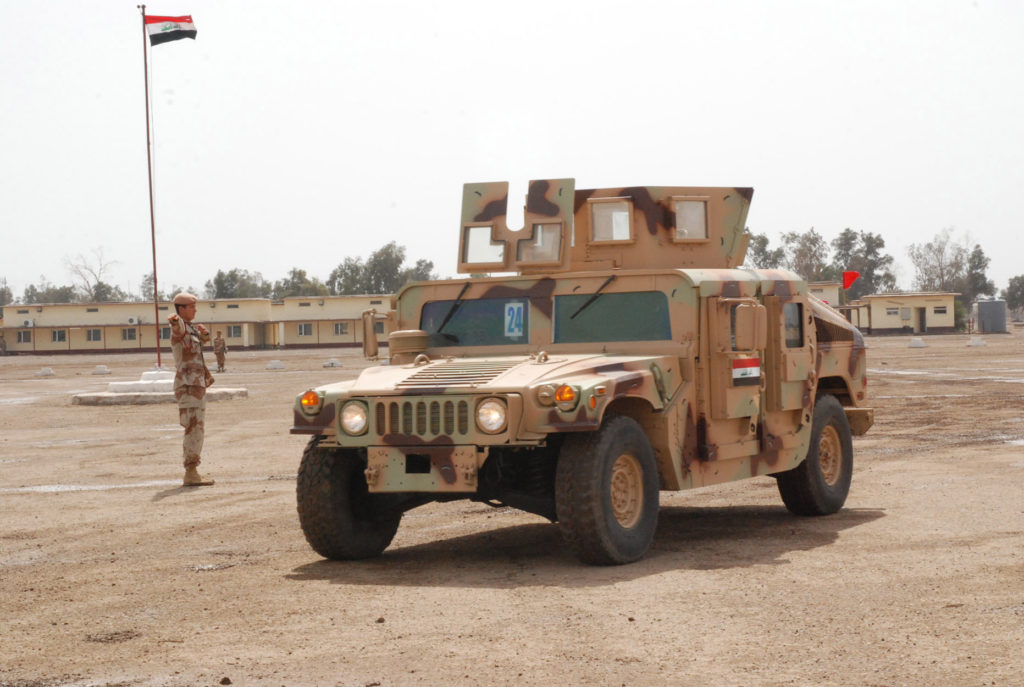The Kurdistan Region Security Council reported on Thursday that Peshmerga forces have repelled attacks by Iraqi Security Forces and Hashd al-Shaabi (Popular Mobilization Units) militia fighters on multiple fronts.
At 6 a.m. local time, PMU and Iraqi forces “began an unprovoked, four-pronged assault of Peshmerga positions in North West Mosul; Bardiya and Hamad Agha towards Ain Ouais, Mosharaf towards Sufaya and from Rabia towards Mahmoudiya,” the KRSC said in a statement.
The forces continue to use U.S. weapons that were given to Iraq to fight Islamic State, according to the statement. These include Humvees, Armored Personnel Carriers and Badger infantry vehicles, which the KRSC accused Iraqi troops of deploying to Kurdish regions earlier this week.
Kurdistan24 reported that Wahid Bakozi, a Peshmerga commander and Kurdistan Democratic Party head in Sinjar, was fatally injured in the assault. Bakozi was wounded in the attack on Zummar and died on his way to the hospital, according to the reports.
A mortar attack at Al Waleed/Al Tanf border crossing in Anbar province killed one person and injured four others, the People’s Defense Units (YPG) in Syria said.
According to reports, Iraqi forces have also been pushing toward the Fishkhabur border crossing, which lies inside the autonomous Kurdistan Region and links it with both Turkey and territory held by Syrian Kurds. On Tuesday, the Peshmerga said they repelled an attack near Fishkhabur. The area holds a major pipeline used to transfer oil from both Iraq and the Kurdistan Region into Turkey.
Turkey has demanded that Iraq close the border between Iraqi Kurdistan and the Syrian Kurds.
Hemin Hawrami, an advisor to KRG President Masoud Barzani, said Peshmerga pushed the PMUs from Mahmoudiya back to Rabia, some 40 kilometers (25 miles) south of Fishkhabur.
The reported attacks come amid the fallout from the Kurdistan independence referendum held on September 25. Following the vote, Baghdad moved to retake oil-rich Kirkuk, which had been largely under Kurdish control since 2014.
The Associated Press on Thursday quoted Coalition spokesperson Colonel Ryan Dillon as saying the fighting “negatively impacted Coalition efforts to defeat ISIS, specifically the inability to move military equipment and supplies to our partners both in Iraq and Syria.”
On Friday, the Coalition told The Defense Post: “In response to allegations that violence between ISF and Kurdish forces is hampering Coalition logistical movements in the region, that is completely false.”
“Although PMF have participated in the fight against ISIS, the presence of some armed groups not responsive to government of Iraq control is destabilizing and undermines our efforts to find a peaceful resolution to the current situation. We support a strong, unified Iraq as defined under its Constitution,” the Coalition said in an emailed statement, referring to the paramilitary Hashd al-Shaabi.
The Kurdistan Regional Government has called on the international community to help resolve the situation. Earlier this month, the KRG representative in the U.S., Bayan Sami Abdul Rahman, told reporters that countries that supported the Kurdish Peshmerga in the fight against Islamic State must intervene to prevent a war between Erbil and Baghdad.
Iraqi Prime Minister Haider al-Abadi on Thursday rejected the KRG’s offer to “freeze” the results of the referendum in exchange for a ceasefire.



